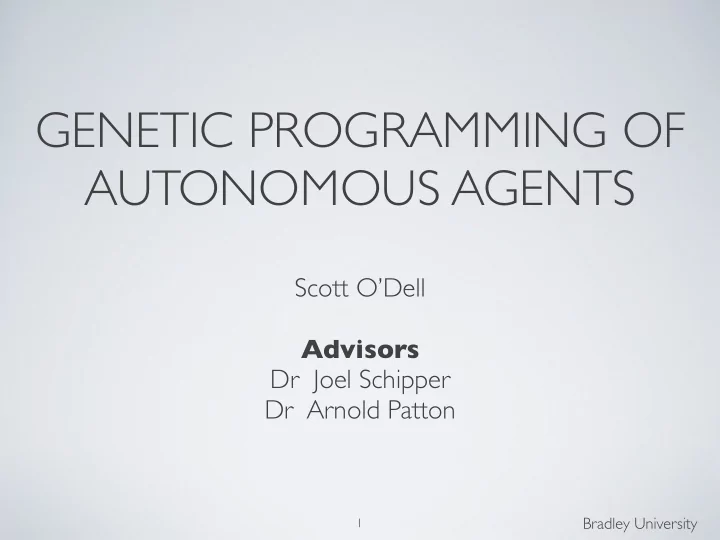

GENETIC PROGRAMMING OF AUTONOMOUS AGENTS Scott O’Dell Advisors Dr Joel Schipper Dr Arnold Patton Bradley University 1
GPAA • Genetic Programming (GP) • Project Description • Results • Conclusion 2
GPAA • Genetic Programming (GP) • Project Description • Results • Conclusion 3
PRACTICAL GENETIC PROGRAMMING
INTRO TO GP • Machine intelligence • Theory of evolution • What you want: fitness function • How to get it: primitive set • GP does the details 5
INTRO TO GP Simulation of Evolution 6
GPAA • Genetic Programming (GP) • Project Description • Results • Conclusion 7
TRADITIONAL METHODS 1. Grid Domain • Movement is unrealistic • Space is warped 2. Complex Primitive Set • Less creative • More work for designer
PERIMETER MAINTENANCE • Military defense application • Intrusion detection • Spatial reasoning
SOFTWARE • GP framework and simulator • Written for project • Ruby • quick development • easy interfacing 10
GPAA • Genetic Programming (GP) • Project Description • Results • Conclusion 11
GRID-BASED SIMULATIONS • Verify software operation • Develop fitness function • 4 guards • Guard sensor range: 4 units • Perimeter around base: 7 units 12
GRID-BASED SIMULATIONS 13
GRID-BASED SIMULATIONS • Primitive Set • Forward, Left, Right • Distance from base • Arithmetic: +, -, *, /, % • if (a > b) then (c) else (d) 14
GRID-BASED SIMULATIONS • Fitness Function Simulation • Enemies randomly start at edge of grid • Move directly to base • Removed if guards sense them • Removed in base perimeter • Fitness Score = Number of enemies detected 15
HOMOGENOUS TEAM . . . . * . . * * . . * ^ * . * * * . . * . * . . * . . * . * . . * . . * . • All guards have . * . . * . . * < . x . > * . same controller . * . . * . . * . . * . . * . * . • Optimal result . * . . * . * . . * * * . * v * . . * * . . * . . . . 16
CO-EVOLUTION OF ENEMIES • Homogenous Guards • Base Perimeter: 7 17
GRID BASED SIMULATIONS • Software works • Exploits grid domain • Results are not practical 18
CONTINUOUS SIMULATIONS • Eliminates warping • Realistic movement • 4 guards • Guard sensor range: 4 units • Perimeter around base: 7 units 19
CONTINUOUS SIMULATIONS • Primitive Set • Base and Direction vector • Store and Recall vectors • Vector arithmetic: +, -, * • Conditionals: vector magnitude and angle • Controller returns vector; determines heading 20
HOMOGENOUS TEAM 21
CO-EVOLUTION OF ENEMIES 22
CONTINUOUS SIMULATIONS • Successful strategies with vector arithmetic • Realistic autonomous agent movement • Unrealistically precise maneuvers 23
UNCERTAIN SIMULATIONS • Generic noise to deal with uncertainty • Develop cautious agents 24
HOMOGENOUS TEAM 25
NOISY SIMULATIONS • GP can produce robust control programs • Guards more cautious • Basic strategy unchanged 26
GPAA • Genetic Programming (GP) • Project Description • Results • Conclusion 27
PRACTICAL GENETIC PROGRAMMING
FUTURE WORK • Autonomous agent platform • Accurately model noise • Test on physical agent 29
QUESTIONS
NOISY SIMULATIONS • Generic noise to deal with uncertainty • Gaussian error added to sensors and movement • Sensor: constant variance = size of guard • Movement: variance = 1/10th of ideal movement 32
Recommend
More recommend